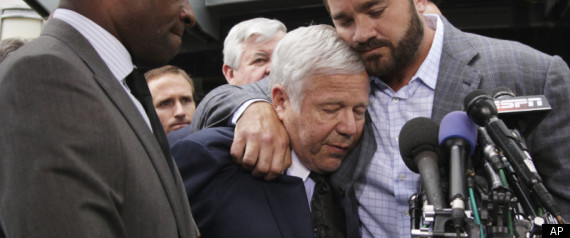But the lockout — at last — has a hero.
That would be Robert Kraft, the soft-spoken, silver-haired Patriots owner who fought back tears and nearly disappeared while wrapped up in that memorable hug from XXL-sized player rep Jeff Saturday.
"A special thanks to Myra Kraft, who even in her weakest moment allowed Mr. Kraft to come and fight this out," Saturday, who plays for AFC rival Indianapolis, said moments earlier.
"Without him, this deal does not get done. ... He's a man who helped us save football."
Kraft is hardly the only guy who deserves credit for ending our long National (Football League) nightmare. But there was a reason his was the name people on both sides of the labor divide kept coming back to while the TV cameras rolled. Kraft's brief turn in front of the microphones had barely begun Monday when it became apparent why.

"I'd like to apologize to the fans, that for the last five, six months we've been talking about the business of football, not what goes on on the field," he said.
From that thoughtful first note, what followed was mostly standard fare. Kraft said the league would flourish, current players would be better protected, and the retirees who built the league's foundation would not be forgotten. He praised Commissioner Roger Goodell, players association chief DeMaurice Smith and player reps Domonique Foxworth and Saturday for not losing sight of "what was good for the game." About the only contribution Kraft didn't get around to mentioning was his own.
Last Friday, he buried Myra, his wife of 48 years, after a months-long battle with cancer. For much of that time, Kraft had been shuttling back and forth between her hospital bed and the bargaining table, largely because he was one of the few owners the players felt they could trust. There was good reason for that, too.
Kraft has riled fellow owners before, and more than a few guys who played — and still play — for his Patriots. He likes to win and makes few bones about it. That explains why he didn't flinch when he forced Bill Parcells out of New England and handing over day-to-day control of the entire operation to his cold-hearted coach, Bill Belichick.
But it was also Kraft who stepped up and took responsibility when Belichick — remember Spygate? — got caught wanting to win by any means necessary. Though few people remember it now, he also relinquished the draft rights to Christian Peter, a fifth-round pick from Nebraska, in 1996 because of a checkered past involving violence against women. What even fewer people knew is that Kraft made the move because of Myra's persistent intervention.
Yet nearly everyone involved in the talks knew something about his wife, and grew to understand what the Krafts meant to each other. That's why so many of the bargaining sessions were held in the Northeast corridor — close to Kraft's base in Boston — but also why Kraft's presence at most of them strengthened the resolve on both sides to get a deal done.
It didn't hurt, of course, that Kraft already had a reputation as one of the few owners willing to speak his mind. And his quip, "We need to get the lawyers out of the way," probably did more to bring about a resumption of face-to-face talks between a select group of owners and players than all the threats of legal action. So it came as little surprise that Smith, the NFLPA's executive director, felt it necessary to echo what Saturday had said only moments earlier.
"We couldn't have done this," he told Kraft, "without you."
"Grace" is a term we throw around in sports with little more thought than some of the lazy spirals that will be arcing over practice fields in 32 towns when training camps open later this week. Remember that when footballs start filling up the air again.
Getting a labor agreement, considering how much Kraft, his fellow owners, his players and everybody else connected to the NFL will profit, hardly qualifies as an unselfish act. But make no mistake: at a time when he had much more important things tugging at his heart, just by showing up, Kraft taught everyone else sitting around the table that some sacrifices are worth making.
___(equals)
Jim Litke is a national sports columnist for The Associated Press. Write to him at jlitke(at)ap.org. Follow him at http://twitter.com/JimLitke .